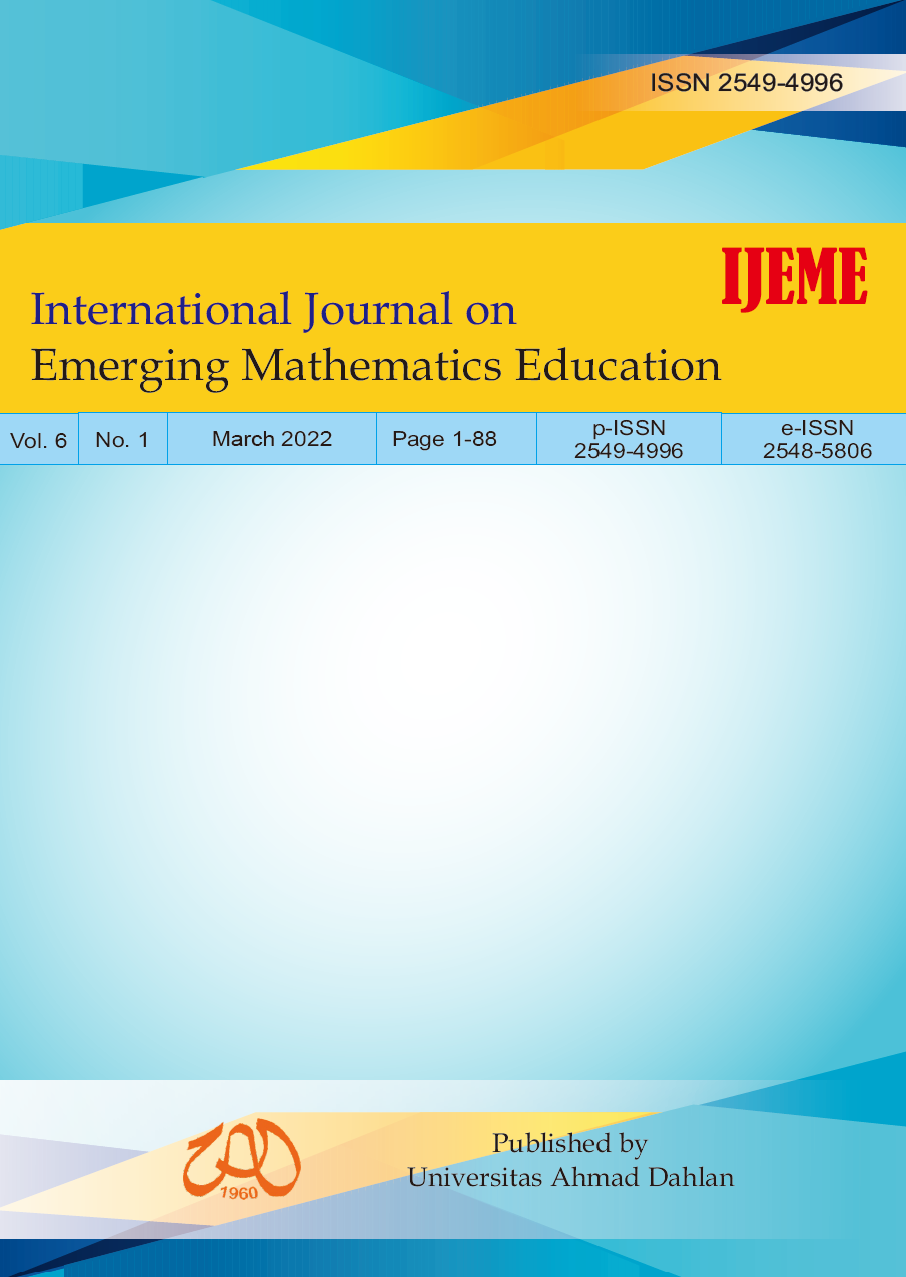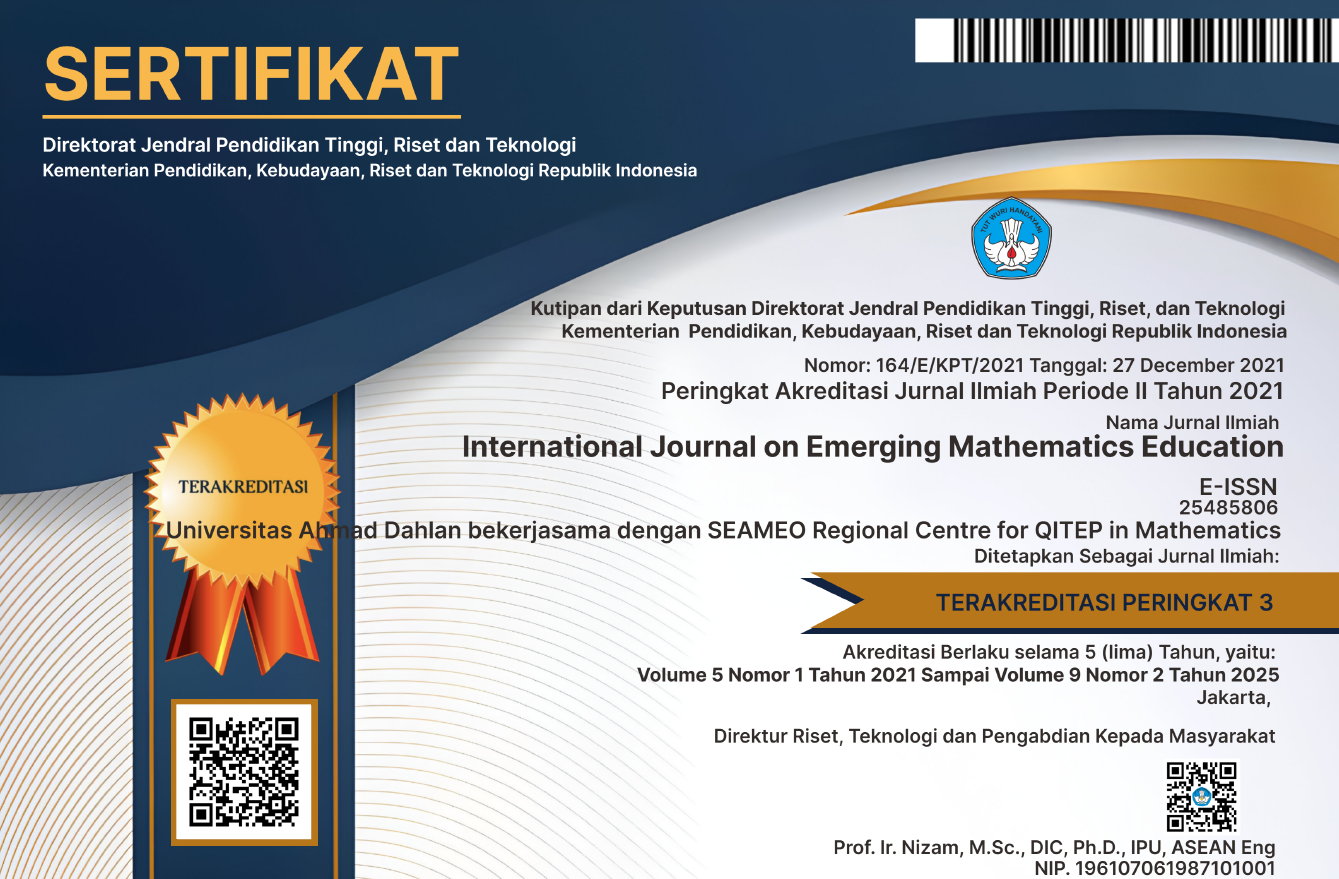Prototyping PISA-like Mathematics Problems for 8th-grade Students Using Javanese Context
DOI:
https://doi.org/10.12928/ijeme.v6i1.22786Keywords:
Javanese context, PISA, school mathematicsAbstract
Javanese context is rich of phenomena potentially used as a starting point to learn mathematics. On the other hand, the Indonesian students’ performance in PISA is consistently low due to the small number of PISA-like problems which can be used to foster the students’ mathematical literacy measured in PISA. Therefore, this research aims to develop a set of PISA-like problems using the Javanese context targeted for 8th-grade students of Junior High School. It is a development study using Plomp’s framework in the stage of need analysis and prototyping. We have successfully developed a prototype of PISA-like mathematics problems using Javanese context. There are six items covering seven basic competences in the 8th-grade of junior high school. The items used various mathematics skills such as communication, representation, mathematization, devising strategies, and reasoning. We could explore some Javanese contexts such as traditional building, transportation, calendar system, community meeting, and historical place. Meanwhile the school mathematics materials include number sequence, Cartesian coordinate, relation, linear function, linear equation system in two variables, and Pythagorean theorem.References
Charmila, N., Zulkardi, Z., & Darmawijoyo, D. (2016). Pengembangan soal matematika model PISA menggunakan Konteks Jambi. Jurnal Penelitian dan Evaluasi Pendidikan, 20(2), 198-207.
Fajrina, M. N., Antariksa, A., & Ridjal, A. M. (2017). Pola Ruang Dalam pada Rumah Tinggal Tradisional Jawa di Desa Brayut, Yogyakarta. Jurnal Mahasiswa Jurusan Arsitektur, 5(1).
Hewi, L., & Shaleh, M. (2020). Refleksi Hasil PISA (The Programme for International Student Assesment): Upaya Perbaikan Bertumpu Pada Pendidikan Anak Usia Dini. Jurnal Golden Age, 4(01), 30-41.
Hidayati, V. R., Wulandari, N. P., Maulyda, M. A., Erfan, M., & Rosyidah, A. N. K. (2020). Literasi matematika calon guru sekolah dasar dalam menyelesaikan masalah PISA konten shape and space. JPMI (Jurnal Pembelajaran Matematika Inovatif), 3(3), 185-194.
MOEC. (2016). Peraturan Menteri Pendidikan dan Kebudayaan Nomor 20 Tahun 2016 tentang Standar Kompetensi Lulusan Jenjang Pendidikan Dasar dan Menengah. Jakarta: Indonesian Ministry of Education and Culture.
Nizar, H., & Putri, R. I. I. (2018). Developing PISA-Like Mathematics Problem Using the 2018 Asian Games Football and Table Tennis Context. Journal on Mathematics Education, 9(2), 183-194.
OECD. (2013). PISA 2012 Assessment and Analytical Framework: Mathematics, Reading, Science, Problem Solving, and Financial Literacy. Paris: OECD Publishing.
Oktiningrum, W. (2016). Developing PISA-" Like" Mathematics Task with Indonesia Natural and Cultural Heritage as Context to Assess Students Mathematical Literacy. Journal on Mathematics Education, 7(1), 1-10.
Putri, R. I. I. (2020). Designing PISA-Like Mathematics Task Using Asian Games Context. Journal on Mathematics Education, 11(1), 135-144.
She, H. C., Stacey, K., & Schmidt, W. H. (2018). Science and mathematics literacy: PISA for better school education. International Journal of Science and Mathematics Education, 16(1), 1-5.
van den Akker, J., Bannan, B., Kelly, E. A., Nieveen, N., & Plomp, T. (2013). Educational Design Research. Enschede: Netherlands Institute for Curriculum Development.
Downloads
Published
How to Cite
Issue
Section
License
License and Copyright Agreement
In submitting the manuscript to the journal, the authors certify that:
- They are authorized by their co-authors to enter into these arrangements.
- The work described has not been formally published before, except in the form of an abstract or as part of a published lecture, review, thesis, or overlay journal. Please also carefully read the International Journal on Emerging Mathematics Education (IJEME) Author Guidelines at http://journal.uad.ac.id/index.php/IJEME/about/submissions#authorGuidelines
- That it is not under consideration for publication elsewhere,
- That its publication has been approved by all the author(s) and by the responsible authorities, tacitly or explicitly, of the institutes where the work has been carried out.
- They secure the right to reproduce any material that has already been published or copyrighted elsewhere.
- They agree to the following license and copyright agreement.
Copyright
Authors who publish with the International Journal on Emerging Mathematics Education (IJEME) agree to the following terms:
- Authors retain copyright and grant the journal the right of first publication with the work simultaneously licensed under a Creative Commons Attribution License (CC BY-SA 4.0) that allows others to share the work with an acknowledgment of the work's authorship and initial publication in this journal.
- Authors are able to enter into separate, additional contractual arrangements for the non-exclusive distribution of the journal's published version of the work (e.g., post it to an institutional repository or publish it in a book), with an acknowledgment of its initial publication in this journal.
- Authors are permitted and encouraged to post their work online (e.g., in institutional repositories or on their website) prior to and during the submission process, as it can lead to productive exchanges, as well as earlier and greater citation of published work.
![]()
Ciptaan disebarluaskan di bawah Lisensi Creative Commons Atribusi-BerbagiSerupa 4.0 Internasional.





